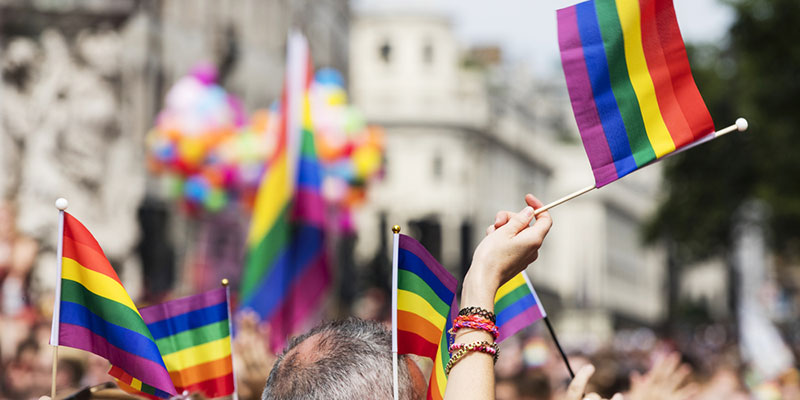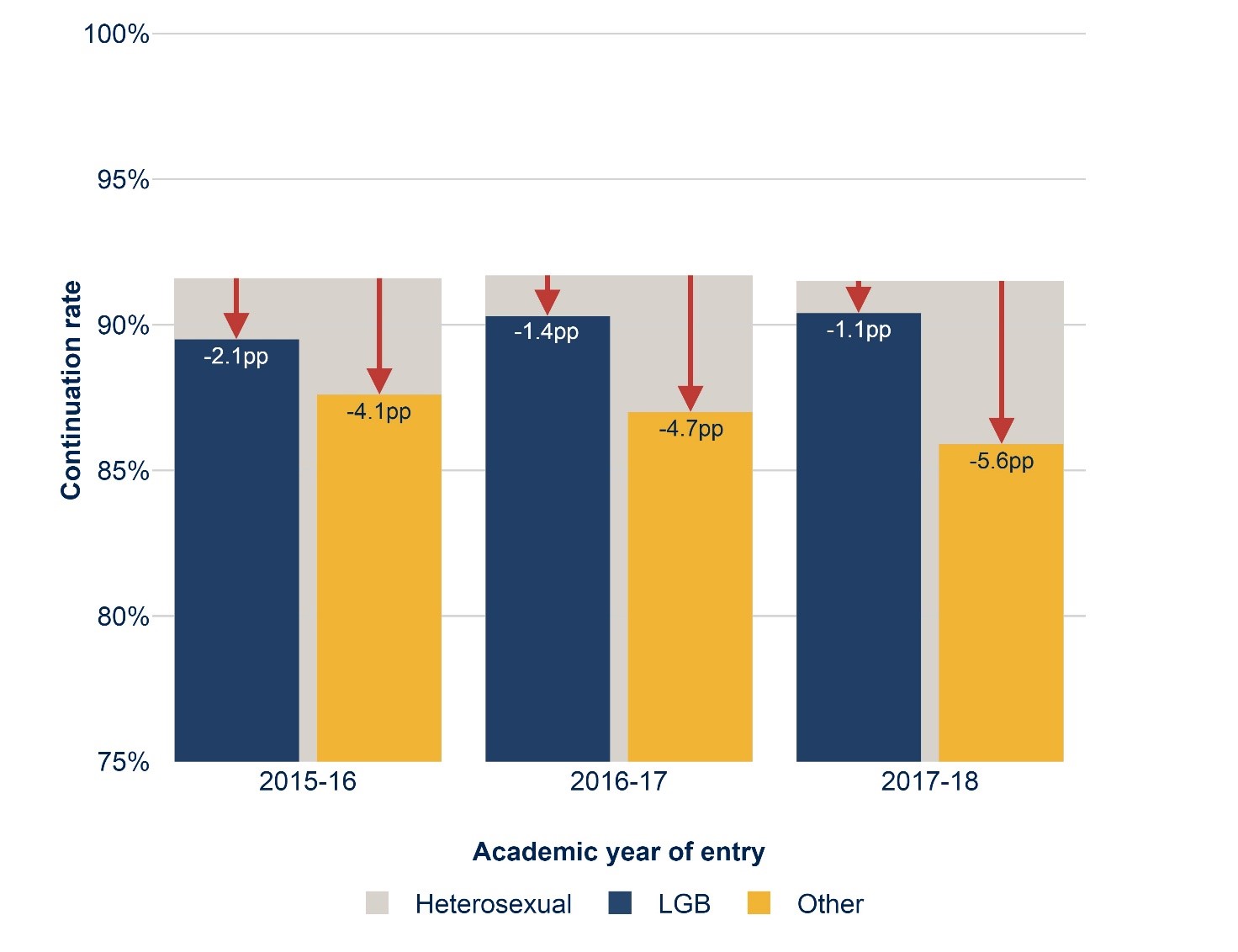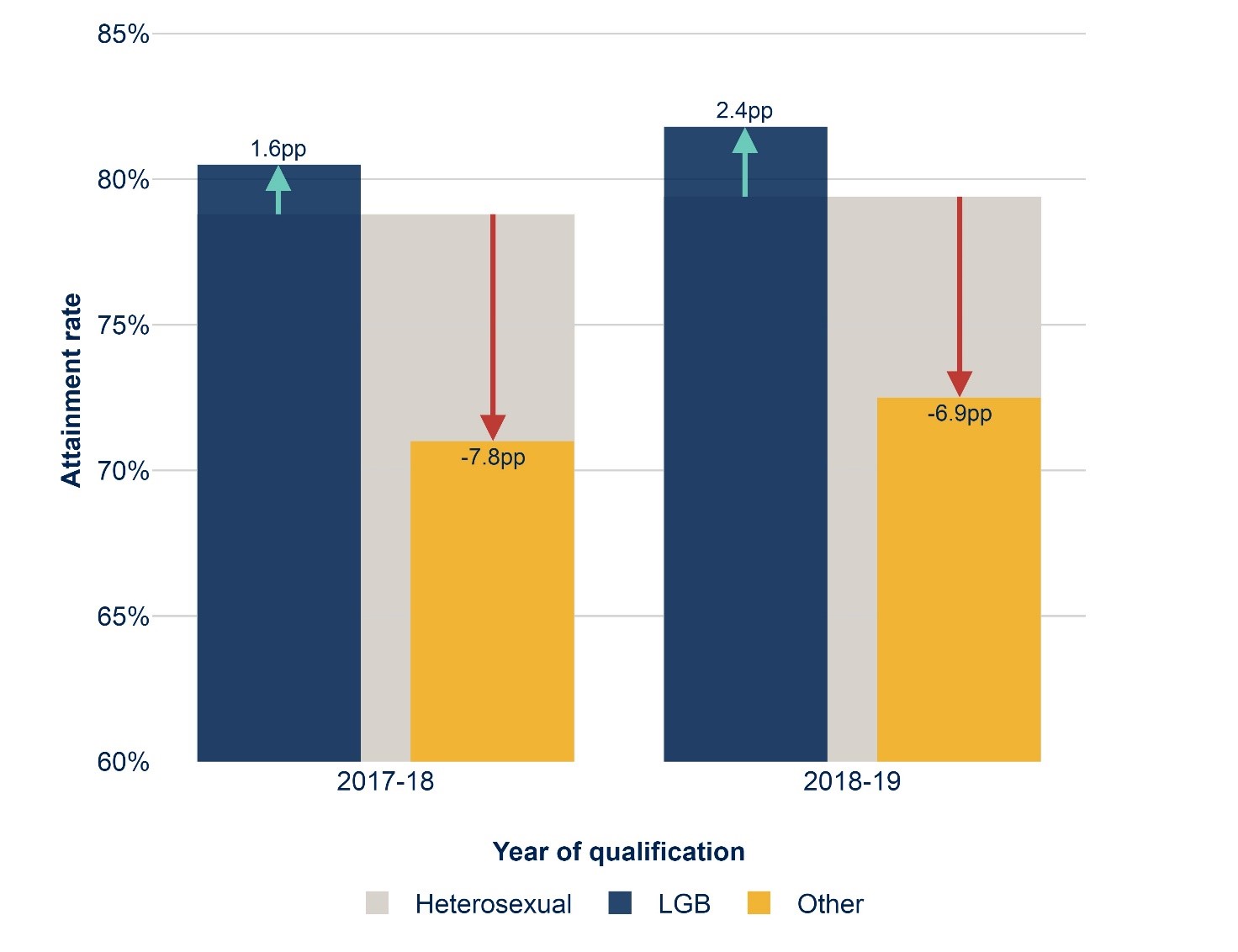Josh Callander discusses our activities to support LGBT+ students and our future ambitions.

In July 2018 the Government Equalities Office launched the national LGBT Action Plan which includes specific actions for the higher education sector to improve experiences for students. As part of this, the Office for Students has been asked to ‘investigate and tackle gaps in participation, experience, safeguarding and success for LGBT students in higher education’. We want to share some of the activities and analysis we have developed, and our ambitions for supporting LGBT+ students in the future.
The Office for Students uses the acronym ‘LGBT+’ to reflect the data we collect through Higher Education Statistics Agency (HESA) student data returns on sexual orientation and gender identity. Where we use a different acronym, this is because of the way the data has been analysed, or is the acronym used by an independent author.
Differences in student outcomes
The Office for Students publishes annual data on LGBT+ students entering higher education in England. These statistics are in the testing phase and not yet fully developed. Our longer term aim is to include LGBT+ student data in our official equality and diversity data.
In the 2018-19 academic year at least 2,900 trans students and 33,000 LGB+ students entered higher education in England (these figures are based on HESA data for UK-domiciled students reporting their sexual orientation and gender identity).
In order to be registered with the OfS, a higher education provider must have an approved access and participation plan in place. We monitor a provider’s performance against the objectives and targets in its access and participation plan on an annual basis.
Over 30 per cent of approved access and participation plans (as of 31 October 2019) mention support for the LGBT+ student community. Examples of activity include mentoring, LGBT+ careers fairs, and tackling anti-LGBT+ harassment and hate crimes.
In June 2020 the Office for Students, for the first time, published data on outcomes (continuation and attainment) for LGB+ students. Trans students are not included in this group because student gender identity data is collected separately to this sexual orientation data.
Figure 1: The differences in continuation rate by sexual orientation for full-time, UK-domiciled, undergraduate students

For 2017-18 entrants, the continuation rate (the number of students continuing their studies after their first year of study) of LGB students was 1.1 percentage points lower than for heterosexual students. The continuation rate of students who are not heterosexual or LGB was 5.6 percentage points lower than heterosexual students.
Figure 2: The differences in rates of achieving a first or upper-second class degree by sexual orientation for full-time, UK-domiciled, first degree and undergraduate with postgraduate components students

For students completing their studies in 2018-19, the attainment rate (the percentage of students achieving a first or upper-second class degree) of LGB students was 2.4 percentage points higher than heterosexual students. The attainment rate of students who are not heterosexual or LGB was 6.9 percentage points lower than heterosexual students.
There is more work to be done to understand the differences in continuation and attainment for LGB+ students. Evidence collected by the Government Equalities Office and Stonewall highlight the impact of discrimination and bullying on LGBT+ students in higher education.
Supporting initiatives and interventions for LGBT+ students
The Office for Students has funded a wide range of projects focusing on student safety and wellbeing. Here are examples from these projects that aimed to provide support for LGBT+ students.
Southampton Solent University delivered two human library events open to students, staff and local communities, including the city’s nearby further education college. The project, which uses the analogy of borrowing books from a library, ‘lends’ people who talk about themselves and their lives with the aim of extending understanding of, and empathy for, people whose religion, mental health condition or sexuality made them susceptible to prejudice and stigma.
The university also produced a series of video interviews exploring the interactions between religion, sexuality and gender identity. The stories they capture are moving and inspiring testimonies to the struggle for understanding and acceptance that many people go through to be true to themselves and to their beliefs.
The University of Worcester has delivered a training programme for students and staff on transgender education and support. The programme includes an overview of the historical and contemporary context, as well as information on what we currently know about trans experiences in higher education. Its development was informed by a working group including representatives from the students’ union and trans students at the university. Project outputs and experiences have been shared at national and international conferences.
Next steps
The Office for Students is aware that more needs to be done to support LGBT+ students in higher education across all stages of the student lifecycle. We will continue to analyse and publish data when available. We will also seek to identify and disseminate effective practice or interventions for supporting LGBT+ students.
In January 2020, we launched a consultation on harassment and sexual misconduct in higher education, setting out expectations for universities and colleges to follow and proposals for how the Office for Students will regulate harassment and sexual misconduct affecting students, including LGBT+ students, in higher education providers. The consultation is currently paused due to the coronavirus pandemic, with a new deadline to be confirmed in due course.
We have developed case studies and resources for supporting LGBT+ students during the coronavirus (COVID-19) pandemic, recognising that this is a group vulnerable to the impacts of the pandemic. Stonewall’s LGBT in Britain – health report shows us that LGBT people are at greater risk of marginalisation during crisis situations, and those with multiple marginalised identities can struggle even more.
If your university, college, students’ union or organisation is interested in contributing to the case studies and resources page please contact me at [email protected].

Comments
Report this comment
Are you sure you wish to report this comment?